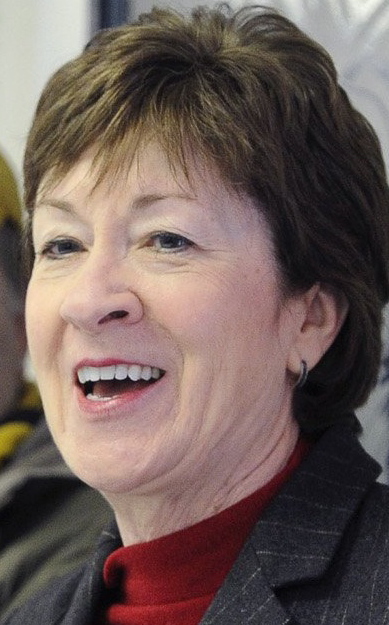The oversized bus, the lawn signs, the T-shirts all carry a simple message: “Susan Collins – our senator.”
“Hi, I’m Susan,” Maine’s senior senator says with a smile as she extends her hand to a group of lunchtime diners at Jess ‘n Nic’s Pizzeria & Pub in Gray. Collins, an 18-year veteran of the Senate who is often seen around the U.S. Capitol wearing colorful skirt suits, is dressed in plain blue slacks, a collared shirt casually unbuttoned at the top, a red windbreaker and unremarkable shoes.
“Hi, I’m Susan,” she says again as she moves to the next group.
From the bare-bones website to the senator’s first-name-only greeting, Collins’ campaign for another six-year term in the U.S. Senate is geared toward simplicity, reassurance – and familiarity. It’s an incumbent defense strategy against an energetic Democratic challenger, Shenna Bellows, who contends that Collins’ portrayal of herself as a moderate Republican willing to buck her party falls well short of the truth when she is in Washington.
Polls suggest the strategy, combined with Collins’ popularity, is holding its own against Bellows’ increasingly aggressive campaign.
“We like her personality and the kind of demeanor that she has,” said Gordon Corbett, who along with his wife, Ruth, strolled over from their nearby home to greet and personally thank Collins during a stop at Ames Farm Center in North Yarmouth. Both Corbetts identified themselves as unenrolled or independent voters – a demographic Bellows desperately needs to win.
Collins, 61, is a Republican in a state that has not voted for one of her party’s presidential picks since the 1980s. As one of the few remaining representatives of the “shrinking center” in Washington, she is often courted by both parties as a swing vote on major issues – and often holds the attention of both her colleagues and the D.C. media by not stating her position publicly until voting day.
She is a pro-choice, anti-Obamacare defense hawk who supports the Keystone XL pipeline but has resisted her party’s attempts to derail President Obama’s plans to regulate carbon pollution.
Collins is also popular at a time when the approval rating for Congress as a whole consistently hovers in the low teens and even dips into the single digits in some polls. A 2013 survey conducted by the Democratic-leaning firm Public Policy Polling said Collins had one of the highest approval ratings for a sitting senator in the country.
The Bellows campaign argues that Collins’ star has dimmed among Democrats and independents because of her opposition to, among other things, a $10.10 minimum wage, the Democrats’ Veterans Affairs bill and an “equal pay” measure. To underscore that contention, the challenger’s campaign is airing ads with former Collins voters now backing Bellows.
The Collins campaign counters that Maine voters don’t have to take its word about the senator’s record of cross-aisle collaboration. Maine’s senior senator was recently ranked as the most middle-of-the-road member of her party in the National Journal’s annual measure of partisanship in Congress.
She was in the national headlines last October for leading a “tri-partisan” group of senators – Republicans, Democrats and Sen. Angus King, I-Maine – that tried to broker a compromise to end the 16-day federal government shutdown. In April, as Collins talked with colleagues about a minimum-wage deal that never came to fruition, The Washington Post ran an analysis titled “How Susan Collins Became the Senate’s Key Deal-maker.”
The New York Times, meanwhile, published a vote analysis in August that ranked Collins and Sen. Lisa Murkowski of Alaska, respectively, as the most likely Republicans to buck their party on votes in the current congressional session (Collins voted with Republicans 58 percent of the time).
“To say I vote in lockstep with anyone is provably false,” Collins said recently. “I think it is very disappointing that my opponent is trying to spread that myth.”
Bellows’ most frequent criticisms of Collins focus on her opposition to a $10.10 minimum wage (Collins and other Republicans contend it will harm businesses and squash jobs), her opposition to the Affordable Care Act and for her votes against the Paycheck Fairness Act. That Democrat-sponsored bill would have, among other things, required employers to justify paying men and women different wages for the same job and allowed punitive lawsuits for wage discrimination. Critics argued the bill would pose a paperwork nightmare for businesses by requiring them to report confidential wage data to the government and would create a windfall for trial lawyers.
The Bellows camp also accused Collins of glossing over her votes with Republicans leading up to the government shutdown.
“The question for Democrats and independents who supported Susan Collins in the past is, whose side will she be on the next time these votes will be taken?” Bellows said recently.
Collins said she was disappointed by Bellows’ “negative campaign” and called it “ludicrous” for Bellows to suggest that she opposed paying women the same as men, noting that President Obama invited her to the White House for the 2009 signing of the Lilly Ledbetter Fair Pay Act, which extended the window for equal-pay lawsuits. Collins also pointed out that both former Sen. Olympia Snowe and later King, who caucuses with the Democrats, opposed the bill.
“It wasn’t the right answer to the problem of pay discrimination in the workplace, and that is why I opposed the bill,” Collins said.
Born into a politically active family in the Aroostook County city of Caribou, Collins credits her parents and the late Maine Sen. Margaret Chase Smith with inspiring her to pursue public service.
Collins was elected to the Senate in 1996 and served many of the years since alongside Snowe, another moderate Republican. Snowe’s retirement at the end of 2012 because of Washington’s hyper-partisanship elevated Collins’ status.
She currently ranks No. 24 in the 100-seat Senate’s seniority list but is the highest-ranking Republican woman. If Republicans win control of the Senate, as some observers are predicting, Collins would be in line (although not guaranteed) to take over as chairman of the Senate Appropriations Subcommittee on Transportation, Housing and Urban Development, as well as chairman of the Senate Special Committee on Aging.
“Seniority really counts in Washington,” Collins said. In addition to working with other senators, veteran lawmakers build relationships with – and have access to – senior officials in presidential administrations, she said.
Incumbency brings with it a host of benefits in congressional races, among them national fundraising ability, party support and, perhaps most of all, name recognition. Collins has outraised Bellows by more than a 2-to-1 margin.
It was clear during Collins’ recent campaign swing through Gray, Yarmouth and North Yarmouth that many Mainers know her.
Some, like the Corbetts, came to meet her for the first time while others, like Caroline Sweeney of Yarmouth, came to greet her again. Sweeney testified before Congress eight years ago at Collins’ request about the importance of improved, continuous monitoring for the Type I diabetes afflicting her then 4-year-old son, Aiden. Sweeney partly credits Collins for helping bring attention, then research dollars to the issue.
“I’m a supporter because I’ve seen the impact, personally, that she has had on my son,” Sweeney said.
In the Gray pizzeria, Collins heard from one woman still seeking help from her office with navigating the Department of Veterans Affairs bureaucracy for her husband’s benefits. Another talked about her challenges acquiring health care.
In downtown Yarmouth, an international student – and his adviser who saw the bus – stopped to thank Collins for her office’s work to help him secure a visa to study in Maine. Another woman, Colombia native Maria Lopez who is now a U.S. citizen, asked Collins to do something to speed up the processing of would-be immigrants, like her son, waiting for years for authorization to come to the U.S.
Bellows, meanwhile, continues to hound Collins on votes she believes are inconsistent with the Republican’s moderate self-portrayal. She also paints a much different picture of the implications of a Collins win – namely, that Maine could help give Republicans the Senate.
“Susan’s first vote will be for Mitch McConnell,” Bellows said in reference to the conservative Kentucky senator likely to be elected majority leader of a Republican-controlled Senate. “The stakes in this race are very high.”
Back on her rolling campaign bus, the incumbent was more reassuring.
“Regardless of whether Republicans or Democrats win, I believe I will continue to play a pivotal role building coalitions and continuing to tackle issues,” Collins said.
Send questions/comments to the editors.





Success. Please wait for the page to reload. If the page does not reload within 5 seconds, please refresh the page.
Enter your email and password to access comments.
Hi, to comment on stories you must . This profile is in addition to your subscription and website login.
Already have a commenting profile? .
Invalid username/password.
Please check your email to confirm and complete your registration.
Only subscribers are eligible to post comments. Please subscribe or login first for digital access. Here’s why.
Use the form below to reset your password. When you've submitted your account email, we will send an email with a reset code.